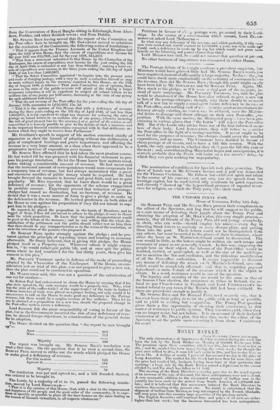The Postage debate of last night confirms a prevalent suspicion,
:hat Ministers would have grieved little had Mr. SPRING Ram's resolthion been negatived,instead ofaffirmed by a large majority. No foe t.2 the plan could have dwelt more emphatically on the certainty of enormous loss to the revenue, than did Mr. SPRING RICE ; though this point might surely have been left to Mr. ComitTitx and Sir Roetaer PEEL. Again, Mr. RICE stuck to his pledge, as if it were a vital part of the measure, in- stead of mere surplusage. Mr. Poeta.= THOMSON, too, said the plan would be abandoned if the House hereafter refused to give a new tax in lieu of the postage-charges ; though, why thieve should be so much talk of a new tax to supply a contiagent future deficiency in Ate case of the Post-office, and nothing said of a ta to make good an ascertainedde- &limey already existing, no reason can be adduced, save the Miaiste- rbil desire to damage and throw obloquy on their own Post-office pro- position. With the sante motive, the Ministerial limp:: have been pro- claiming in various places that "the Lords" will rejeet the Post-office Bill. But if the Lords take advice from one of the hest-informed mem- bers of their body, Lord ASHAVIITON, they will refuse to consider the Post-office in the light of a taxing-machine. It never ought to be used for the purposes of reventle; the charges should cover the needful expenditure, and no more. The Commons have decided in favour of cheap postage at all events, and to have a bill this session. With time Lords, the only question is, whether they shall pass the bill this year or the next ; and, notwithstanding Ministerial hopes and anticipations, it is scarcely probable that the Peers will insist on a few months' delay, by which they can gain nothing but unpopularity.


























 Previous page
Previous page